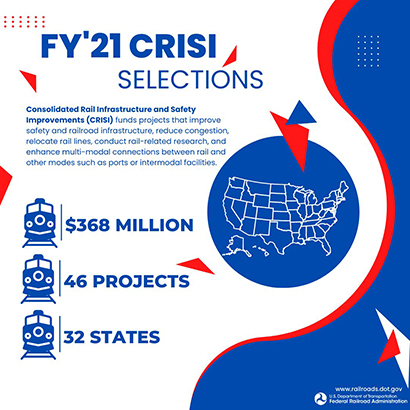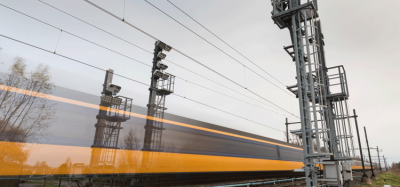FRA announce over $368 million in grants to improve rail infrastructure
Posted: 9 June 2022 | Elliot Robinson (Editorial Assistant - Global Railway Review) | No comments yet
The FRA grant funds are for 46 projects in 32 states and will be vital in modernising rail infrastructure and strengthening supply chains.
The Federal Railroad Administration (FRA) has announced over $368 million in Consolidated Rail Infrastructure and Safety Improvements (CRISI) grant programme funds to 46 projects in 32 states and the District of Columbia. These investments will play a crucial role in modernising rail infrastructure and strengthening supply chains throughout the United States, helping to reduce congestion and get people and goods where they need to go quickly and more affordably. The programme will create good-paying jobs and benefit urban and rural communities across the country.


Credit: FRA
The selected projects announced will not only improve and expand passenger rail and fund conventional and high-speed rail, but they will also increase supply chain resilience and fluidity, support short line railroads, invest in new technology and safety advancements, and benefit rail industry workforce development and training activities, helping to create jobs and increase economic growth.
President Biden’s Bipartisan Infrastructure Law has nearly tripled funding for this critical rail infrastructure programme, to $1 billion a year for the next five years. Strengthening supply chains and increasing the productive capacity of the economy are key tenets of President Biden’s plans to get goods from ships to shelves more quickly and lower costs for American families.
“Americans deserve a world-class rail system that allows people and goods to get where they need to go more quickly and affordably, while reducing traffic and pollution on our roads,” Pete Buttigieg, U.S. Transportation Secretary, said. “We’re proud to award these grants to improve passenger rail for riders and strengthen the freight rail that makes our supply chains and our economy work.”
“This round of CRISI grants, one of the largest ever, is a major step forward for the Biden-Harris Administration’s efforts to revitalise and rebuild the country’s infrastructure,” Amit Bose, FRA Administrator, said. “These awards will allow FRA to support rail projects that lay the groundwork for future economic growth.”
CRISI aims to advance intercity passenger and freight rail projects that promote FRA’s key goals of safety, economic growth, transportation equity, and sustainable and resilient infrastructure. CRISI-funded projects will enhance multi-modal connections, address slow orders, and fix up 100-year-old track to speed up the movement of goods from ports to rail to trucks to shelves. As the U.S. continues to recover from the COVID-19 pandemic, these upgrades and expansions will help state and local governments and rail carriers meet renewed travel demand and strengthen supply chains.
Content you may also enjoy:
FRA announce new bipartisan programme to transform U.S. passenger rail network
Central Florida to receive grant for Brightline intercity passenger rail project
CHSRA apply for over $1 billion in federal funds for high-speed rail project
Some examples of the projects being funded this year are the Heart of Georgia Americus Sub Upgrade Project (Up to $6,190,137), the Port of Baltimore Rail Capacity Modernisation Project (Up to $15,680,000), the Raleigh to Richmond Corridor Infrastructure Engineering & Safety Programme (Up to $57,900,000), the Southwest Kansas Infrastructure Upgrade Project (Up to $10,991,971), the Florida Panhandle Rural Capacity Expansion Project (Up to $8,300,000), the Great Lakes Corridor Improvement (Up to $21,340,300) and the Development and Implementation of HBCU Based Railroad Engineering Programme for Underrepresented Communities (Up to $4,592,637)
By statute, a minimum of 25 per cent of this funding must be awarded to rural projects, and this announcement includes nearly double the required investment in rural communities, which underscores the Biden Administration’s commitment to addressing the needs of rural communities. In addition, $87.6 million is for projects that support the development of new intercity passenger rail service, and $25.7 million is for capital projects or engineering solutions targeting trespassing, exceeding the required statutory minimums. Historically, CRISI has funded projects that improve safety and railroad infrastructure, reduce congestion, relocate rail lines, conduct rail-related research, and enhance multi-modal connections between rail and other modes such as ports or intermodal facilities. Workforce development projects are also eligible to support the education and training needs of rail workers.
The CRISI programme has drawn significant interest from states, local communities, and rail stakeholders since its inception, and this year FRA received more than $1.1 billion in CRISI requests, which far exceeds the available funding. FRA applied rigorous selection criteria to ensure that eligible projects would serve communities by enhancing safety, creating economic opportunities, providing energy efficient transportation options, and helping the country’s world-class freight network meet growing demand.
Related topics
Funding & Finance, High-Speed Rail, Infrastructure Developments, Operational Performance
Related organisations
Federal Railroad Administration (FRA), U.S. Department of Transportation (USDOT)








